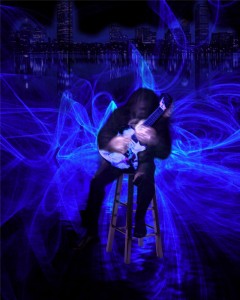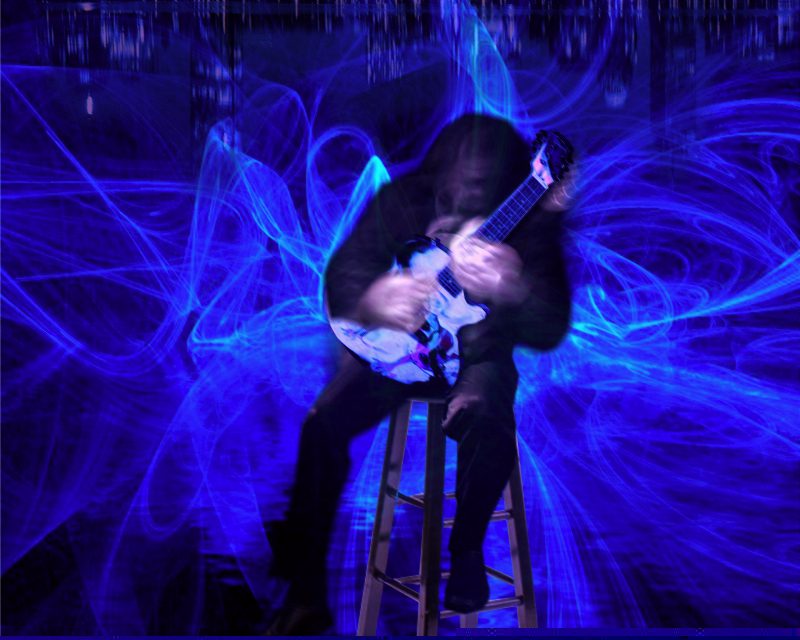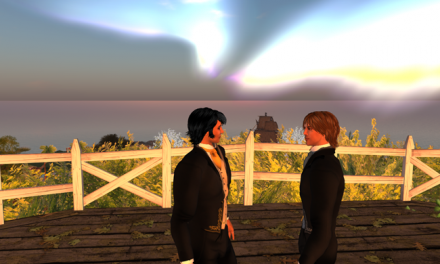 Fairy Dust Guitar
Fairy Dust Guitar
by John Miller
Smoke’s lazy haze hangs over the bar and the customers chatting over their drinks. Some patrons actually listen to me play. It’s a packed gig but sedated,a mellow husk I carve myself into, boring into their brains via their senses. Just me and my guitar.
The pretty woman in the corner is having an affair with the young man holding her hand. While the married woman is happily in love with the young man, the future is paved with black days and suicide, as her lover slips away eternal one lonely night—two cuts, two slits along the wrists—when she can’t find time to return his urgent text messages. After his funeral, she grows old alone, locked in a dry marriage to a man she has grown past hating, finally accepting her life, until she finds herself headed to the grave, having lived a life of hollowed out misery.
Her Greek Tragedy eyes sweep the room, lighting upon the old woman at the bar, sitting beyond the clustered tables. I follow her gaze to that elderly serf on the barstool who tries hard to exert control, to waylay tears, because the doctor’s analysis burns inside her twenty-year-old purse. She’s spent all her life cooking-for and looking-after her children and grandchildren, because she is codependent on her family—even now, in this place, in this bar—trying to buy her way into their hard hearts. They take her for granted, her family, with the children and grandchildren demanding her attention, her menial care. She has applied band-aids and salve to wounds for so long she has become something beyond human to her family, a fixture taken for granted, like oxygen. All she has now, after years of doting over children who look right through her, is that twenty-year-old purse on the bar and a gin and tonic. That and the physician’s report burning in her purse like the cancer searing into her brain.
Before the distraught old woman is another serf, another silent worker: Sam the barkeep wipes the brass rail and asks the old lady if she’s fine. She doesn’t hear, or perhaps she chooses not to, lost in the conflagration burning in the aged leather thoughts. Sam cannot know this about her, nor can he see the note in her purse foretelling of her demise; he can only sense her pain with empathy, ask once again if she’s okay, and cringe when she again ignores his words.
Sam shrugs and walks away irritated that—once again—he’s ignored. The classic starving artist, he can’t get his work into any galleries. He has no following, no name. Self taught? Not in this town.
No one wants to place a drink order, and they’re short-handed as always, so Sam moves to the clustered tables, past the owner of the bar sitting with paperwork at a booth. Sam pours his dreams into a bottomless pit as he empties the contents of glasses into the gray plastic tub, bussing tables between taking care of patrons at the bar, customers like the old woman who will ignore him like the art galleries and critics who look through him. He carries the tub back to the bar. Warm beer pools in the tub and, like his dreams, looks like vomit. I can hear him swallow bile all the way on the stage where I sit, where I breathe in their pain and begin to strum my faerie dust guitar.
It’s magic, you know, that guitar. But then, all faerie dust guitars are magic.
I hum with my guitar, the microphone picking up my baritone voice, speakers pushing syllables of pain and angst into every corner of the room, and my hands move slow, as if my guitar is my lover and I’m taking my time, enjoying the act of foreplay. But the sounds oozing from my guitar are anything but sensual; my accompanying voice bleeds into a mournful dirge as my guitar gently weeps for the gathering.
Sadness becomes a presence that addicts, that draws them into the song and syllables floating. Those magic words full of pain and angst drip with remorse, echoing and mirroring the melancholy within the listeners own hearts. It is a process I have seen thousands of times, going from bar to bar, a drifter with a purpose: to make the whole world weep with past hurts, to get it out of their collective system, to heal.
The sprite within the guitar cries in empathy, a wood nymph I found in the woods two years earlier. I invited her into my wooden instrument while camping in the Colorado Rockies. This is a fact I seldom share with fellow musicians for fear they’ll think me crazed; it is something I know is true and enjoy, for it has given me a new lease on life. My music hasn’t been the same since.
We connect, the spirit and me, as she moves within the wood and strings that I strum, my fingers clicking only wire but casting magic. Through me she reaches those most hurting, through my voice and fingers and song; the symbiotic relationship between this simple spirit and me intensifies, until liquid sorrow pours into each chord and note and syllable; the pain she siphons from the crowd flows into and through us, bleeds into our song which is never the same.
No one speaks. They’re all listening now. Those standing sway to my strumming fingers, like entranced puppets, and still my guitar gently weeps. Drops like condensation appear on the Gibson Guitar, and the liquefied essence of the patrons’ pain coalesces like blood, seeping down the face of my faerie dust guitar as Emily cries within the hollowed out wood of my instrument.
That is what I named her: Emily. A spirit responding to humanity’s pain, because she knows what’s it like to be an outcast, because her own kind gave her the boot. I found her in exile after my bitter divorce. I can remember it clearly, walking along the game trail illuminated by moonlight, and there she was, Emily in that clearing, her tears melting frost from surrounding branches and the snow-covered ground. The sounds of her sobbing pulled from within my own breast the tears I’d refused to unleash, that great weeping sadness that comes as a deluge of sudden explosiveness, the kind that occurs in complete surprise because it’s been buried so long, tucked deep within one’s hidden parts, so that when it manifests it does so surprisingly, with volcanic tendency.
She moved toward me upon a dark rainbow of my grief and tears manifesting as shadow, Emily gravitating toward my heart that was filled with pain, surrounded by cold Colorado pine. There she kissed me, inside, deeper than my deepest hurt, a gentle brush of ephemeral lips against the muscle pulsing in my sobbing chest. From my center she oozed through limp arms into the guitar I’d brought with me to play during my final hours.
The barbiturates were already in my system taking effect, the empty pill bottle in my backpack; I’d come to rid myself of the pain once for all, to remove the sting of bitter divorce, to do what I did best and loved, to lay down with my guitar in my hands playing and breathing out my last breath in song. But now Emily ate the barbiturates within, swallowed my pain like a jagged little pill, and I began to strum as she made my guitar weep.
From the hole over which stretched six strings, her golden light glowed and we both knew, in that moment and time, that she had come home and so had I.
What happened that night in the Colorado wild happens again in the bar, a complete reenactment of when Emily and I met; history repeating itself. The bar’s patrons feel what I felt so long ago, that deep-seated angst believed forever gone, yet eternally festering inside, consciously unfelt until Emily’s gift brings it forth.
I look out at the hurting hearts gathered, feeling what Emily feels, knowing what Emily senses, and I hear her weeping deep inside my guitar, inside my heart and voice and guts, and I realize we belong together. All of us belong here in this moment, locked in perfect synchronicity, while my guitar gently weeps mournful sounds of raptured release.
Our song sounds like musical sobs set to the chords of my Gibson, the wailing dirge of a mother who has just lost her infant in the still of the night, and the crushing-felt blows of a shattered heart. It is the pain of the bar itself, the gathered and collected unconscious hurts unified in song and syllable, words I don’t know, words that just flow from my lips to mirror what already exists in those listening. Eyes glazing now, tears slipping from proud faces no longer too self-conscious to cry. Trembling lips twitch on a few faces that bow down to Emily by the sheer act of acknowledging hurt.
Emily draws their pain like a sponge absorbing water. She feeds off it parasitically, devouring the adultery in the corner, the cancer at the bar, and the shattered dreams serving drinks. Emily’s voice alters in tone—only I can hear it because of our heartfelt bond—and a cheerful lisp sounds from my guitar, like a happy Country twang or a note changing in pitch. I match it with my fingers and voice.
Great relief jettisons into the room, lightens the mood. The ambiance burns argent as the gray bar blooms with gladness and color. The effect is so sudden one cannot notice it unless you look for it. It’s like a cloud that’s blocking the sun’s face that slides on past. Everything brightens and tears evaporate. The change is that sudden, that swift—as easy as breathing air and singing song.
The woman in the corner looks up and smiles, she pulled her hand from her lover and her lover turns in synchronicity with her toward the stage. The tempo increases as Emily’s feet tap out a rhythm within the wooden instrument on my lap, the vibrations of her tempo slapping wooden vibrato into my lap, and I rock on my barstool, playing faster and making love to Emily, oozing into a bluesy tempo and then into something that can only be described as happy.
Even the old woman at the bar notices.
A man and woman enter the bar, obviously siblings, maybe twins. They move to the old woman at the bar, to the gin and tonic in her trembling hand and to her leathered purse of secrets.
“Mother, we’ve been looking all over for you,” the daughter says.
The son says, “The doctors called saying they sent the letter to the wrong ‘Miller.’ You have high blood pressure.”
“Only high blood pressure,” the daughter says.
The son adds, “Can you believe it, mom?”
The elderly woman’s pain siphons into my guitar, a mushy tumor that has passed into my abdomen and now moves through and out of my belly; a physical monstrosity pushing out of me and into the back wooden panel of my Gibson. Inside the guitar, Emily eats the cancer growing, feeding on that grandmother’s pain. We share it together, Emily and me, as the tumor passes painlessly first through me and then into the guitar. Pain that eats, feasts inside the nice old woman, is now pain relieved by Emily’s consumption. Even the old woman’s doctors forget her pain, for that’s the way it always is, as Emily eats and reality melts like butter.
The old woman holds her head and cries as they hug her, just as the bartender’s cell phone rings a happy tone. Sam answers, smiling at the old woman united with her children in a glamour-induced healing of sorts, and his jaw drops in astonishment.
“A showing? At the gallery?” Sam pauses and looks at his cell phone in unbelief, then tosses his apron on the bar before speaking again. “You want to show my work? Hell, yes!”
Something stronger fills the air now, an ambiance of hope. It shines upon faces that actually glow, like stars in the void of space, grinning up at the stage. Possibilities emerge where none before existed, for Emily has eaten their cancers and heartaches and loss and grief; she chews upon the fat of their drudgery and slurps marrow from their splintered bone-dreams, until those visions slip into reality like the barkeep’s sudden dream-come-true. At that very moment, winsome vibes abide as our music wins their hearts and consumes their pain, burning bright into reality with what they really desire and need.
Sam speaks to the owner of the bar then leaves in a hurry. The owner moves behind the bar, shaking his head with a delighted smile. He asks the old woman if she’ll have another, but she says she’s fine and leaves with her children, followed by the adulterous woman from the corner. The young man remaining in the corner listens to us, to Emily and me, as we weave our magic that brings healing. The young man remains at his booth, seemingly oblivious that his lover has just left, when he’s greeted by an old girlfriend from high school.
Anything can happen now, like a dream within the bar where faerie dust makes true desire come true. And, like dreams, the patrons will forget how powerful the music sounds within their bones, how it vibrates in their souls. All they know as they leave the bar is that something has changed for the better, and they will soon forget Emily and me, the smiling people taking with them the magic of our song, our gift to them. Because we know their pain, we feel their hurt every time we play, and we grow stronger on their pain with each performance.
After fifteen minutes, the crowd shuffles out with smiles. Some put money into my jar, and others leave their sorrows behind. The “new” couple from the corner heads to the exit holding hands. The young man’s eyes darken as they scan the bar, looking but not finding, then those dark eyes light up again when gazing upon the woman beside him.
A new crowd drifts in like shadows. They sit with idle chatter and Emily’s singsong voice (unheard by all save me) dips into the depths of human sorrow, stabs into the gut of pain, drawing it out, while my guitar gently weeps and Emily gently feeds.
Heads turn.
I am weeping within their hearts, listening to their pain; connected to them, feeling and bleeding alongside them just as strongly as I’m connected to Emily within my guitar. I am a conduit between them and Emily and the healing they don’t even realize they need. In that moment of perfect connectedness, I realize we belong together. All of us belong here in this moment, in this time, while my guitar gently weeps mournful sounds of raptured release. Condensation collects on the face of my Gibson. The crowd emits a collective sigh. I tap my foot to the dirge-like rhythm, wondering how long it’ll take to heal the world one bar at a time.



Thanks, Lee!
Steven, I came back to read this story again, realizing that of all the stories of mine published, this is one of my favorites. I only found one typo, a past tense word that should have been present tense, and that is entirely my fault. I love this story because it is based on George Harrison’s song, and also because Michael Pennington requested this song personally for Aurorawolf – I never submitted it. Also, Jack Rogers’ artwork of the guitar player on the barstool is perfect. And, like the synchronicity of the bar, I feel very much as if a type of synchronicity pulled us all together here with this story: Michael, Jack, the song and me and my story. And, yes, “jagged little pill” was a direct reference to another great song writer.
If you ever see this, thank you so very much for commenting.
Nicely written. I love the casual references to “Jagged Little Pill” and “As My Guitar Gently Weeps.” Awesome allussion to the role music plays in American culture. Great job!
I love this story!